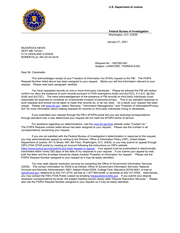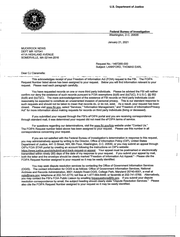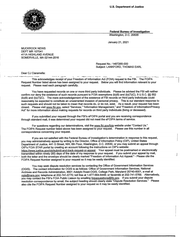Tom Lankford FBI files
| Tracking # |
1487265-000 |
| Submitted | Jan. 17, 2021 |
| Est. Completion | None |
MuckRock users can file, duplicate, track, and share public records requests like this one. Learn more.
Communications
From: CJ Ciaramella
To Whom It May Concern:
Pursuant to the Freedom of Information Act, I hereby request the following records:
- All records, including cross-referenced files and ELSUR records, concerning Birmingham News reporter Thomas Earl Lankford (Sept. 20, 1935 - Dec. 31, 2020), who covered the Civil Rights Movement. Proof of death is not required, as his death has been widely reported: https://www.nytimes.com/2021/01/15/us/tom-lankford-dead.html
The requested documents will be made available to the general public, and this request is not being made for commercial purposes.
In the event that there are fees, I would be grateful if you would inform me of the total charges in advance of fulfilling my request. I would prefer the request filled electronically, by e-mail attachment if available or CD-ROM if not.
Thank you in advance for your anticipated cooperation in this matter. I look forward to receiving your response to this request within 20 business days, as the statute requires.
Sincerely,
CJ Ciaramella
From: Federal Bureau of Investigation
There are eFOIA files available for you to download.
From: Federal Bureau of Investigation
The request has been rejected, with the agency stating that it can neither confirm nor deny the existence of the requested documents.
From: CJ Ciaramella
This is an appeal under the Freedom of Information Act regarding request No. 1487265-000.
I. The Request
On Jan. 18, 2021, requester C.J. Ciaramella, a reporter for Reason Magazine, filed FOIA request # 1487265-000 to the FBI seeking "all records, including cross-referenced files and ELSUR records, concerning Birmingham News reporter Thomas Earl Lankford (Sept. 20, 1935 - Dec. 31, 2020)." The request included a hyperlink to a New York Times obituary of Lankford: https://www.nytimes.com/2021/01/15/us/tom-lankford-dead.html
According to the New York Times, Lankford “worked hand in glove with the city’s police department and the F.B.I.”
On Jan. 21, 2021, the FBI issued a Glomar response rejecting the request and refusing to acknowledge whether responsive records existed or not. The FBI cited Exemptions (b)(6) and (b)(7)(C), the latter of which exempts from disclosure “records or information compiled for law enforcement purposes” if their production “could reasonably be expected to constitute an unwarranted invasion of personal privacy,” 5 U. S. C. §552(b)(7)(C).
II. Lankford's Privacy Interests Do Not Meet the Bar for a Glomar Response Under Exemptions (b)(6) and (b)(7)(C).
The D.C. Circuit has noted that “the privacy inquiries of Exemptions 6 and 7(C) are essentially the same.” Judicial Watch, Inc. v. Dep’t of Justice, 365 F.3d 1108, 1125 (D.C. Cir. 2004).
Under the balancing test established in Nat’l Archives & Records Admin. v. Favish, 541 U.S. 174 (2004), a requester seeking to overcome Exemption 7(C)’s privacy protections and alleging government misconduct must “produce evidence that would warrant a belief by a reasonable person that the alleged Government impropriety might have occurred.”
In this case, the New York Times notes that Lankford “was involved in an effort to trap [Martin Luther King, Jr.] in a vice sting. Using a wiretap he had placed on the phone of A.D. King, Dr. King’s brother, the police learned that the two were planning a sexual liaison with a group of women. The police and Mr. Lankford, who was manning the tap, followed them in their car; at one point an officer told him to be ready to snap a photo of the compromised civil rights leader, and to yank down Dr. King’s pants if he still had them on.”
A reasonable person would consider it improper for the government to use a photojournalist to tap the phones of civil rights leaders and photograph them in compromising situations. Federal and local law enforcement’s surveillance and harassment of activists during the Civil Rights Movement is well-established, was sanctioned at the highest levels of government, and is still a source of significant public interest. Records of law enforcement’s use of Lankford as an informant would “shed light on an agency’s performance of its statutory duties,” which is one of the “core purposes” of the FOIA. United States Department of Justice v. Reporters Committee for Freedom of the Press, 489 U.S. 749, 772-73 (1989).
Consideration of the agency's performance is critical to the balancing test. “[T]he only relevant public interest in the FOIA balancing analysis [is] the extent to which disclosure of the information sought would ‘she[d] light on an agency's performance of its statutory duties' or otherwise let citizens know ‘what their government is up to.’ ” Dep't of Def. v. FLRA, 510 U.S. 487, 497, 114 S.Ct. 1006, 127 L.Ed.2d 325 (1994).
Deceased individuals also have diminished privacy rights under exemptions (b)(6) and (b)(7)(C), which must be taken into account when balancing private and public interests. Schrecker v. U.S. Dep’t of Justice, 349 F.3d 657, 661 (D.C. Cir. 2003).
Not only does the New York Times article establish that Lankford is deceased and has diminished privacy interests, it also shows that Lankford's cooperation with the FBI is already public knowledge, further limiting the reputational damage to him or his surviving family if the mere existence of FBI records concerning him are acknowledged. Particularly sensitive records are segregable and can be redacted under normal FOIA procedures without resorting to the Glomar response. An agency is required by law under 5 U.S.C. § 552(b) to produce any “reasonably segregable” portion of the records being withheld.
Additional factors such as the passage of time and the public disclosure that Lankford cooperated with the FBI heavily outweigh Lankford’s diminished privacy concerns and the rationale for a Glomar response. A categorical refusal to search for records under Exemption 7(C) is only appropriate if, in balancing privacy interests against the public interest, “the balance characteristically tips” toward nondisclosure. U.S. Dep’t of Justice v. Reporters Comm. for Freedom of the Press, 489 U.S. 749, 776 (1989). FBI records on deceased individuals are routinely processed and released, fully or with appropriate redactions. The requester frequently files requests for the FBI files of recently deceased individuals and has never encountered a privacy-based Glomar response before.
Because the balance characteristically tips toward disclosure in cases such as these, and because the records concern a matter of significant public interest, they are not subject to a Glomar response under Exemptions 6 and 7(C). Accordingly, I appeal the FBI's determination and ask that my FOIA request be processed and completed. Sincerely,
CJ Ciaramella
Files
pages


